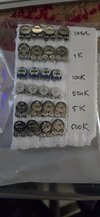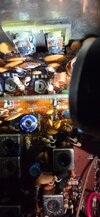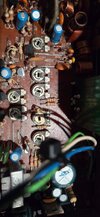Hi RF Krazy, I finished the truck, gotta take it in for an alignment at 8:30. I got the toe in/out set pretty close just eyeballing it, but the camber/caster adjustment is beyond me so I just set it like it was. Drives like a new truck again, even without an alignment. Alright, enough shop talk. When I get back, I will look over the schematic and give you some points to check.
So, from what I gather, when you soldered the connections wrong, you just tied the mic audio input to ground, right?
Do you think you may have applied echo board power to mic input when jumpering?
Gotta figure out what was fed to the mic input.
Say, do you have a scope?
Hello cable Guy,
Yeah camber/caster is for the shop that has the alignment equipment. But Hey, if it drives like a new one, you must had gotten pretty darn close! Good Job.
Yes, I wired the mic audio to pin 1, mic ground, and mic ground to mic audio, reversing the wires on the radio mic jack.
Some how or another is when the growling had started. At one point I had even tied the chassie ground to PTT.
The only wires I believe I had crossed on the echo board are the input/output and the the PTT wires. What ones I had actually cross together, I now do not remember. But I am pretty sure I did not cross any "hot" wires so to speak.
As far as crossing echo power wires to mic input, I don't believe so, but at this point, I wouldn't rule it out, I am sorry to say.
On the echo board that I have, there are also wires that get connected on the side of the board. The wire colors are Y, Green, Blu, and Purple. Green has been cut and not connected. Can someone tell me what these wires are?
I have a scope, but since I had moved, I cannot find the leads. I have an old Tektronix 465. I will continue to look for them, but I have a lot of stuff still in bins that are hard to get to, but never the less.
I have been studying the the schematic, and making a Shot Gun Parts list for now.
Some parts I cannot find online. There is one company that demands a $250.00 minimum. It seems the more expensive parts company "RF Parts", has more to offer than Mouser and Newark. I will probably order a little from each, depending on the total shipping cost. It may be cheaper to spend more then less when compared to spending more on shipping on more then one company at a time?
I have been trying to draw out a sketch of my wrongfully reverse wiring scheme to compare it to the schematics to help me see things more clearly.
Has anyone ever seen an OP amp weaken instead of just being shorted or opened? Looking at the schematics, the Op amp inputs are 3, and 5. From what I can see, 3 is the main mic audio input. I think 1 and 7 are the out puts.
I am suspecting the lower audio is due to something on the input side of IC4 the Op amp???
Anyway Cable Guy, I am glad to hear you have your truck back together. I am sure that is a relief.
Thanks again for helping.
RF Krazy





